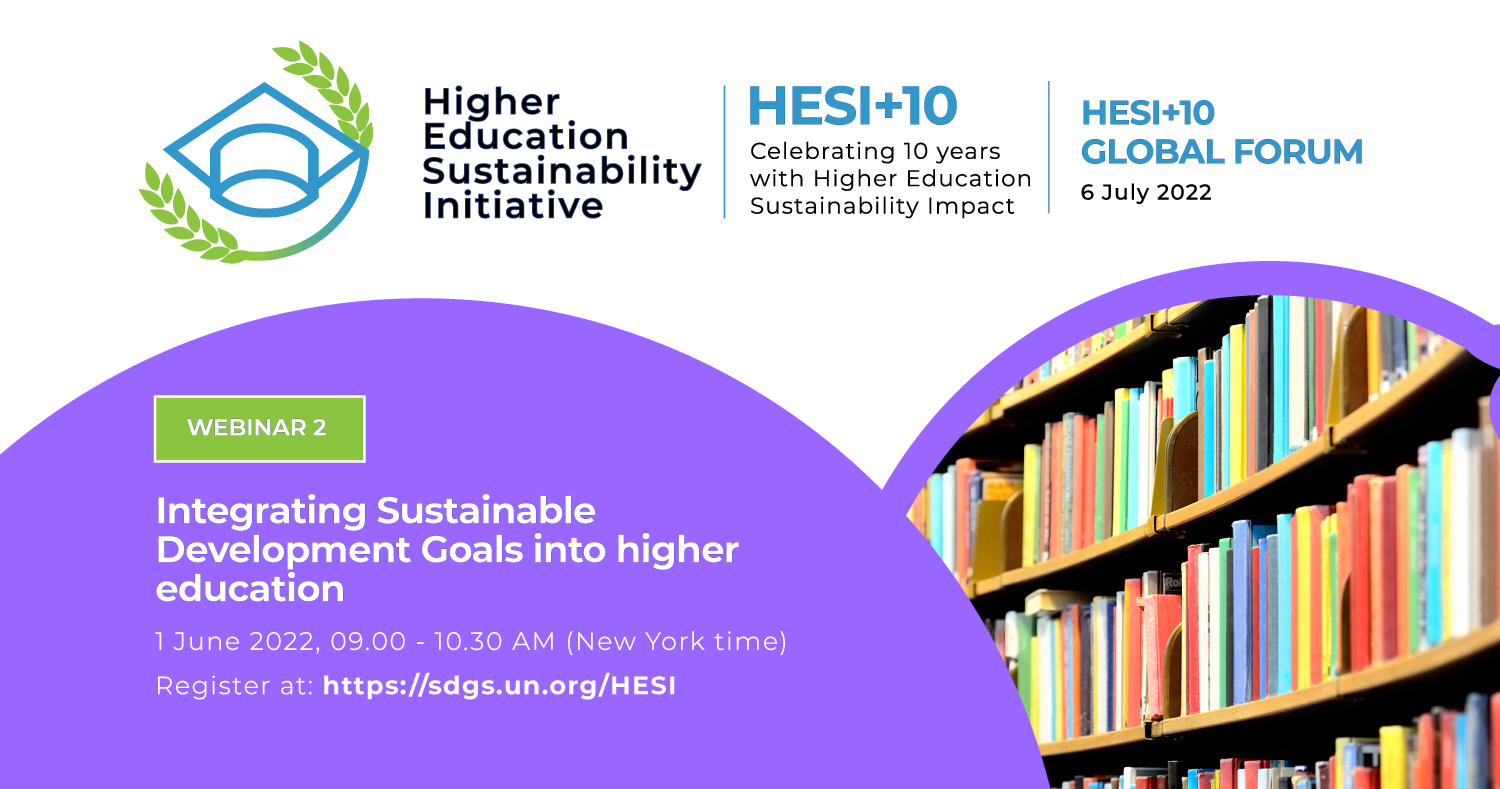News
The Higher Education Sustainability Initiative discusses integrating the Sustainable Development Goals into Higher Education

New York, 1 June 2022— The Higher Education Sustainability Initiative (HESI) hosted the second of a series of three webinars organized in the lead-up to the HESI+10 Global Forum which will highlight the role of higher education in building back better from COVID-19 and advancing the 2030 Agenda for Sustainable Development. The HESI+10 Global Forum, will take place on 6 July 2022 as a special event to the High-level Political Forum on Sustainable Development and will spotlight HESI’s 10th Anniversary since its launch at the 2012 UN Conference on Sustainable Development (or Rio+20 Conference).
In an informative yet practical webinar titled “Integrating the Sustainable Development Goals (SDGs) into Higher Education”, HESI convened a group of higher education experts to discuss challenges and opportunities around integrating the SDGs into teaching, researching, partnerships and organizational practices of higher education. The event, which had over 80 participants was opened by Mr. Ola Goransson, from the Division for Sustainable Development Goals of UN DESA and Co-Chair of HESI, who welcomed the audience to the event. Following, Ms. Florencia Librizzi, Senior Advisor, Sulitest and Co-Chair of HESI, then led a feedback exercise with the audience that captured some of the key challenges and opportunities of embedding the SDGs into higher education, including how the pandemic has helped to increase SDG awareness.
The event featured a distinguished panel moderated by Jean-Christoph Carteron, Co-founder and President of Sulitest and Senior Advisor to HESI.
The first panelist, Dr. Akio Takemoto, United Nations University, reflected on the importance of knowledge and support in integrating the SDGs and implementing them across the board. Furthermore, he called to take advantage of the opportunity to use course/program development to address synergies between climate change and sustainable development and the SDGs more broadly.
Dr. David Smith, Director, Centre for Environmental Management, Coordinator, Institute for Sustainable Development, University of the West Indies, on the topic of long-life learning on real life issues pointed out the importance of leveraging the flexibility of online educational opportunities that exists currently. He provided an example referring to the natural disasters such as hurricanes in the Caribbean and how they were able to train employees and micro-enterprises across the Caribbean to build climate change resilience.
Dr. Ana Simaens, Iscte Business School argued that higher education is increasingly pressured to include the SDGs into their strategy, research, and curriculum. She called to break silos and take a more holistic approach to education by embracing sustainability, and adopting an interdisciplinary approach that can tackle the real life challenges of our times and fulfill students’ expectations to be prepared for those challenges. She mentioned several initiatives such as PRME, GRLI, Sulitest, the SDG Academy, SDSN, GBSN, among others, as resources to utilize in this journey to integrate sustainability into higher education.
Dr. Isabel Rimanoczy, Convener, PRME Working Group Sustainability Mindset, underscored the importance of developing conscious behavior in the next generation, in terms of a sustainability mindset that is reflected in the way to be, think and act. This also implies, she added, an awareness of the impact of individuals on their surroundings. She shared about a Sustainability Mindset Working Group that she created to help develop resources with professors to help instill that mindset to their students.
Mr. John Thwaites, Monash Sustainable Development Institute & Climateworks Centre, reminded the audience that higher education must focus on transdisciplinary approaches to solve complex issues, including by collaborating and partnering between different universities in the global north and south. He provided an example of collaboration in Indonesia, where they could address issues of water and sanitation in informal settlements through nature based-solutions. He noted that such efforts would positively impact not only the environment but also children's health. This effort is no longer a pilot as they now have been working on 25 communities, involving hundreds of people in several countries. On the educational side, he pointed out that students do not only have to learn but also be able to use entrepreneurship skills to find innovative solutions to advance the SDGs.
Dr. Arif Satria, Director, IPB University, focused his remarks on the need to change behavior, mindset and attitudes, including developing adaptive change mindset and skill sets as a result of new curricula. He also flagged innovation as a key aspect to incorporate the SDGs and keep the community connected. He provided an example concerning farmer markets in Jakarta, which in collaboration with the private sector were able to bring new innovation to farmers such as e-market to help them become more productive and innovative in their businesses.
Ms. Florencia Librizzi, closed the webinar by sharing the next steps for HESI+10, which include upcoming webinar “Inspirational higher education initiatives for SDG 4, 5, 14, 15 and 17” on 21 June, followed by the HESI+10 Global Forum on 6 July 2022 and thanking the speakers and the audience for an insightful session.
The Higher Education Sustainability Initiative is an open partnership between several United Nations entities and the higher education community launched in the run up to the United Nations Conference on Sustainable Development (Rio+20 in 2012).
HESI is currently chaired by the United Nations Department of Economic and Social Affairs (UN DESA) and SULITEST. Other UN partners include UNESCO, UN Environment Programme, UN Global Compact’s Principles for Responsible Management Education initiative, UN University, UN-HABITAT, UNCTAD, UNITAR and UN Office for Partnerships.
For more information about HESI and how to join, please visit https://sdgs.un.org/HESI
